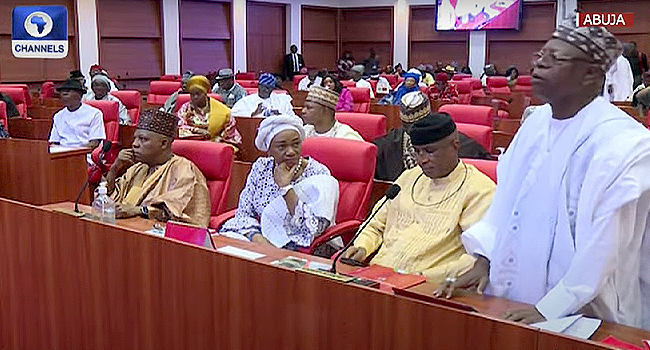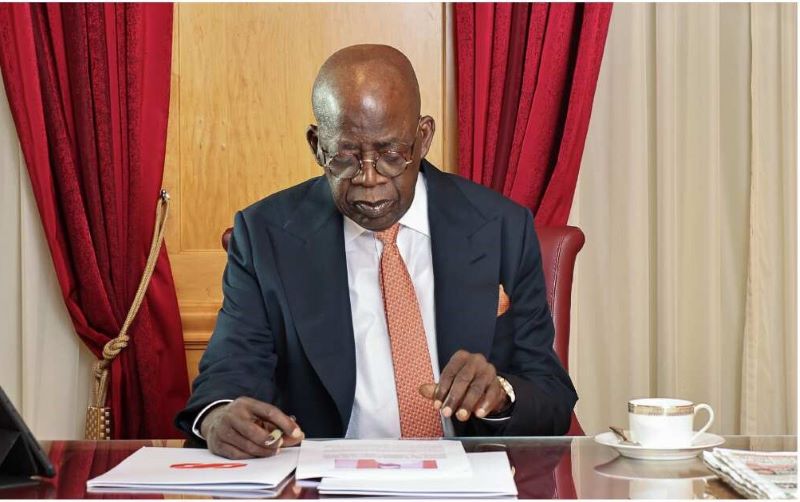Legislature
‘Stability of Nigeria is better than stability of your pockets’ Shettima tells senators-elect

***Urges them to vote wisely on Tuesday
***I am still confused how I am able to continue in the journey – Oluremi Tinubu
The Vice President of the Federal Republic of Nigeria, Senator Kashim Shettima on Saturday admonished incoming 10th National Assembly to work for the stability of the country instead of linning their pockets
Shettima who represented Borno Central in the 9th Senate before his election as Vice President spoke during the valedictory session of the 9th senate.
“To my incoming colleagues, I will leave you with a paradox. The stability of this nation is superior to the stability of our pockets. On Tuesday, let us vote wisely. Let us vote for the Nigerian nation.
“To my fellow colleagues who will depart from this chamber, I address you not as colleagues left behind but as experienced lawmakers who have become an integral part of my history.
“We have shared many things in common and standing shoulder to shoulder in times of adversity. We have fought relentlessly for the betterment of our dear country.
The wife of the President senator Oluremi Tinubu in her speech said she owe all her successes to God and her husband President Bola Ahmed Tinubu who has been there for her giving her useful pieces of advice
“God sustained me for three terms, from 7th Assembly to 9th Assembly. I am still confused how I have been able to continue the journey, because serving the nation takes a lot of sacrifice.
“It started with the sacrifice from your homes, your children even your better half. It is also a great privilege for all of us that are here because over the years, we have made friends, brothers, sisters across our various tribes, ethnicity and religious divide.
“We have the entire Nigerians being represented and we were able to forge ahead and come together when we need to make very good decisions in the overall interest of the nation. We did that as elder statemen and women.
“My thanks will go to my husband for even giving me support. He gives me advice when I seek for it. He gave me the freedom to be myself self and to be able to make contributions necessary to improve the lives of our people especially out women, youths and children.
“God used me to do exploits in this hallowed chamber. I did all that is required of every legislator. Motions, bills including those that had been assented to by law.”
The senate had held its valeditory session starting with the issuance of certificate of Legislative service to mark the end of the 9th senate preparatory for the inauguration of the 10th national Assembly billed for Tuesday the 13th of June, 2023
The President of the Senate Ahmad Lawan who presided over the valedictory plenary session announced the order in which senators will be invited to receive their certificate of Legislative service for 109 senators.
According to him, the clerk of the
Senate will issue the certificate to the president of the senate and his deputy Ovie OMo-Agege.
He said, the Senate President will issue the certificates to other senators starting with the Vice President, Senator Kashim Shettima followed by the First Lady Oluremi Tinubu and the Deputy Chief of Staff to the President, Senator Ibrahim Hadejia
Others according to hierarchy were, Kaduna State Governor Uba Sani, Akwa Ibom State Deputy Governor Dr Akon Eyakenyi.
Legislature
Adebayo Defends National Assembly’s Power to Remove CCT Chairman

The Social Democratic Party (SDP) presidential candidate in the 2023 general election, Prince Adewole Adebayo, has addressed the controversy surrounding the National Assembly’s removal of the Code of Conduct Tribunal (CCT) chairman.
Speaking on the matter, Adebayo argued that the legislature acted within its authority and emphasized the importance of integrity in public institutions saying that they have the power to remove the president and Commander-in-Chief of the Atmed Forces
The Nigerian Senate last Wednesday, invoked Section 157(1) of the 1999 Constitution (as amended) to remove the Chairman of the Code of Conduct Tribunal (CCT), Danladi Umar, from office.
The decision followed the adoption of a motion sponsored by Senate Leader, Senator Opeyemi Bamidele (APC-Ekiti), during plenary.
The motion titled “Invocation of Provision of Section 157(1) of the Constitution for Removal of the Chairman of the CCT” was unanimously supported by the Senate.
Senator Bamidele, while presenting the motion, emphasized the sacred role of the CCT in maintaining high moral standards in government business and ensuring public officials adhere to principles of accountability and integrity.
He argued that the conduct of Danladi Umar fell short of these expectations.
Key allegations against the embattled Chairman according to the Senate leader included Corruption and Misconduct with Multiple petitions alleging corruption and misappropriation of funds.
There were Reports of Mr. Umar being absent from office for over a month without official permission.
He was also accused of refusal to Cooperate with Senate Investigations as he only appeared once before the Senate Committee on Ethics, Code of Conduct, and Public Petitions and avoided subsequent invitations.
He was also accused of engaging a physical altercation with a security guard in the Federal Capital Territory, an incident described as unbecoming of a public servant coupled with ongoing investigations by the EFCC, ICPC, and DSS which the senate refferred to a gross misconduct and negligence.
The Senate replaced Umar with President Bola Ahmed Tinubu’s nominee Mr. Abdullahi Usman Bello whose appointment was confirmed on July 4, 2024.
This decision has sparked criticism, with some legal experts arguing that the legislative body relied on a section of the Constitution—Section 157(2)—that applies to the Code of Conduct Bureau (CCB) and not the tribunal.
Critics claimed the removal process was flawed and that the legislature overstepped its bounds.
However, Adebayo who is also constitutional lawyer of repute dismissed the assertions, asserting that the National Assembly has the constitutional authority to discipline public officers, including the CCT chairman.
Adebayo explained that under the principle of separation of powers, the executive, legislative, and judicial branches serve as checks on each other.
“The National Assembly has oversight powers over public institutions, including the judiciary. The CCT chairman, while heading a judicial body, is still a public servant subject to the disciplinary powers of other branches of government,” Adebayo said.
He added that the Code of Conduct Tribunal, unlike the superior courts, operates as a unique judicial body tasked with trying violations of the Code of Conduct. As such, it falls within the legislature’s purview to act when misconduct occurs.
“If the National Assembly and the executive agreed that an official should be removed, that decision stands. The same principle applies to other branches of government intervening in cases of misconduct within their counterparts,” he explained.
Adebayo emphasized that the debate should not be reduced to legal technicalities but should focus on the ethical standards required for such critical roles.
“The chairman of the CCT is the custodian of public ethics. Any hint of misconduct undermines public trust in the tribunal and the judiciary. Someone in such a position must be above reproach, as their role is to enforce the same standards they must exemplify,” Adebayo said.
Reports of alleged misconduct involving the former CCT chairman, including unprofessional behavior, have further fueled public outcry. Adebayo argued that officials in such positions should step down voluntarily when their integrity is questioned.
Addressing the legal arguments raised by critics, Adebayo highlighted the difference between the Code of Conduct Bureau (CCB) and the Code of Conduct Tribunal (CCT).
“The CCB is an administrative body under the executive, responsible for compliance and asset declaration. The CCT, on the other hand, is a judicial body tasked with trying violations of the Code of Conduct. While the two institutions are distinct, both are subject to oversight and discipline by the legislature and executive,” he explained.
Adebayo urged Nigerians to approach the issue with objectivity, focusing on accountability rather than partisan arguments.
“The removal of the CCT chairman is about preserving the integrity of our institutions. This is not a matter of partisanship or legal maneuvering—it’s about ensuring that public servants are held to the highest ethical standards,” he said.
While some critics have called for judicial intervention to challenge the removal, Adebayo maintained that the National Assembly’s actions align with constitutional principles.
He emphasized the need for public officers, particularly those in sensitive roles, to maintain the highest levels of decorum and professionalism.
“This incident should remind us of the importance of accountability in governance. The integrity of our public institutions must remain sacrosanct,” Adebayo concluded.
Legislature
NASS modifies NDLEA Act, Prescribes Life Imprisonment for Drug Traffickers

The National Assembly has modified the National Drug Law Enforcement Agency (NDLEA) Act to prescribe life imprisonment for individuals found guilty of storing, transporting, or concealing illicit drugs and substances.
The amendment was adopted on Thursday during plenary, presided over by Deputy Senate President Barau Jibrin, following broad support from the senators.
The amendment reflects a harmonised position of the Senate and the House of Representatives on Section 11 of the NDLEA Act.
The House had earlier passed an amendment prescribing life imprisonment for drug traffickers, while the Senate had proposed the death penalty.
To reconcile the differences, a conference committee of both chambers was convened. Senator Tahir Monguno, Chairman of the Senate Committee on Judiciary, Human Rights, and Legal Matters, presented the harmonised version to the Senate.
He urged lawmakers to adopt the House’s position of life imprisonment, arguing that enforcing the death penalty could lead to the execution of over 900 accused persons currently awaiting trial for drug-related offenses.
The Deputy Senate President who presided over the plenary had put the resolution to a voice vote, and the majority of senators supported the amendment.
The approved version stipulates life imprisonment for offenders.
The amended section now reads:
“Anybody who is unlawfully involved in the storage, custody, movement, carriage, or concealment of dangerous drugs or controlled substances and who, while so involved, is armed with any offensive weapon or is disguised in any way, shall be guilty of an offence under this Act and liable on conviction to be sentenced to life imprisonment.”
This amendment aims to strengthen the fight against drug trafficking while addressing concerns over human rights and the judicial implications of the death penalty.
The move is part of efforts to curb the growing menace of drug trafficking and its adverse effects on Nigerian society. According to Senator Monguno, the life imprisonment penalty strikes a balance between deterrence and humane judicial practice.
With the amendment, the NDLEA now has a robust legal framework to prosecute offenders and combat drug-related crimes effectively.
Legislature
President Tinubu urges Senate to approve ₦1.767trn External Loan

President Bola Ahmed Tinubu has formally requested the National Assembly’s approval for a $2.209 billion (₦1.767 trillion) external borrowing plan to finance part of the ₦9.17 trillion fiscal deficit in the 2024 budget. The loan, included in the 2024 Appropriation Act, is critical to the government’s broader strategy for economic recovery and growth.
In a letter to Senate President Godswill Akpabio, President Tinubu noted that the borrowing aligns with the provisions of Sections 21(1) and 27(1) of the Debt Management Office (DMO) Establishment Act, 2003. He also indicated that the Federal Executive Council (FEC) had approved the plan.
The President explained that the funds would be sourced through Eurobonds or similar external financial instruments. A detailed summary of the loan’s terms and conditions accompanied the letter to guide legislative scrutiny.
“This borrowing is necessary to address the budget deficit and fulfill our fiscal strategy for 2024. Swift approval will enable us to move forward with mobilizing these funds,” the President stated, emphasizing the urgency of the request.
Senate President Akpabio referred the matter to the Committee on Local and Foreign Deb
-

 Crime1 year ago
Crime1 year agoPolice nabs Killer of Varsity Lecturer in Niger
-

 News10 months ago
News10 months agoFCT-IRS tells socialite Aisha Achimugu not to forget to file her annual returns
-

 Appointment1 year ago
Appointment1 year agoTinubu names El-Rufai, Tope Fasua, others in New appointments
-

 News From Kogi1 year ago
News From Kogi1 year agoINEC cancells election in 67 polling units in Ogori-Magongo in Kogi
-

 News From Kogi1 year ago
News From Kogi1 year agoEchocho Challenges Tribunal Judgment ordering rerun in 94 polling units
-

 News1 year ago
News1 year agoIPOB: Simon Ekpa gives reason for seperatists clamour for Biafra
-

 Metro8 months ago
Metro8 months ago‘Listing Simon Ekpa among wanted persons by Nigeria military is rascality, intimidation’
-

 News11 months ago
News11 months agoKingmakers of Igu/ Koton-Karfe dare Bello, urge him to reverse deposition of Ohimege-Igu
